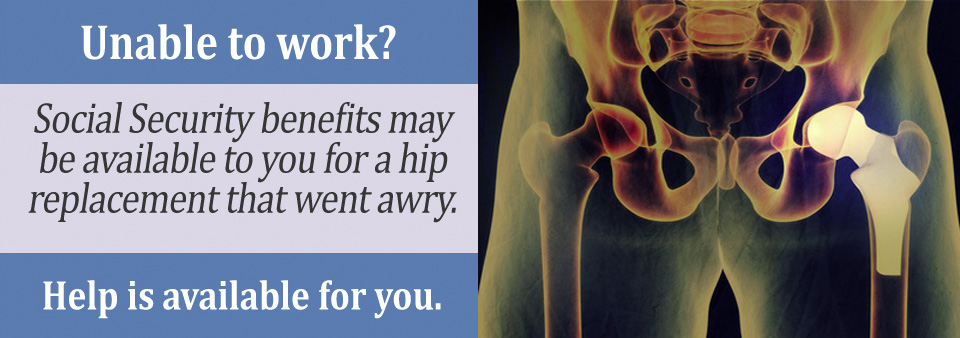Millions of Americans are impacted by chronic hip conditions, such as hip arthritis. As the hip is one of the largest joints in the body, any discomfort or malfunction can make everyday tasks such as putting on shoes or walking very difficult. For some individuals with severe hip conditions, it becomes impossible to continue working.
The Social Security Administration recognizes that certain medical conditions, such as chronic hip problems, may make it impossible to continue employment. Individuals with long-term illnesses can sometimes qualify for an Social Security Disability Insurance (SSDI) award.
What Types of Hip Problems Might Qualify for a Disability Award?
The majority of hip disorders are relatively minor, and individuals who are affected by them typically face a quick recovery. While they may present discomfort, the Social Security Administration (SSA) considers most hip disorders temporary or manageable. For example, individuals who have chronic pain due to osteoarthritis of the hip can often manage the pain through physical therapy and pain medication.
However, in some instances, the hip condition deteriorates, and the discomfort becomes so severe that the person affected loses the ability to function normally. Individuals with a chronic hip condition may face pain, limping, inability to bear weight, referred pain to other joints such as the knee, and reduced range of motion. Some hip conditions that may cause long-term problems include osteoarthritis of the hip, rheumatoid arthritis, and some hip fractures.
Is Hip Dysplasia a Disability?
Yes, it can be considered a disability if it limits you from working for at least 12 months. This is one of the main reasons for qualifying for disability benefits. You should use the Blue Book Listing 1.18 to determine if you qualify for disability benefits. Your symptoms need to be as follows:
chronic joint pain or stiffness;
abnormal motion, instability, or immobility of the affected joint(s);
an anatomical abnormality of the affected hip joint(s) confirmed by a physical examination or through imaging which shows a narrowing of the joint space, bony destruction or ankylosis or arthrodesis of the affected joint.
You need to prove your physical limitation is expected to last for a continuous period of at least 12 months, backed up by the following medical documentation:
proof that you require a walker or other assistive device such as crutches or a wheeled and seated mobility device controlled by your hands;
proof that you are unable to use one upper extremity to independently initiate, sustain, and complete work-related activities
Is Hip Arthritis a Disability?
Yes, it is a disability according to the SSA if it keeps you from working for at least 12 months. The SSA’s Blue Book listing 14.09, which covers inflammatory arthritis, describes the symptoms that categorize the severity of hip arthritis eligible for disability benefits.
If you have inflammatory hip arthritis, you may qualify for disability benefits when certain joints necessary to walk or to perform gross motor or fine motor functions are impacted by the disorder. You will need to show you have to use devices to aid your movement such as a cane, a pair of crutches or a seated mobility device.
If You Need a Hip Replacement
Some individuals with severe hip pain face the possibility of a total hip replacement. While this procedure is 95% effective for those who have surgery, a small number of people face long-term continuation or worsening of the problem.

Hip replacements are specifically listed in the Social Security’s medical guide, often referred to as the Blue Book, under Musculoskeletal Section 1.03. Those people who have had reconstructive surgery of the hip and are unable to ambulate (or are unexpected to be able to ambulate) for a year after the operation would be considered disabled under the SSA’s definition of disability.
These individuals must be incapable of sustaining a reasonable walking pace over a sufficient distance to maintain their activities of daily living. For example, if a year after your hip replacement surgery you have difficulty getting to work without the use of a walker, two crutches, or help from another individual, you might be considered for financial assistance from the SSA. Further, if you have trouble going to the grocery store or the bank without significant support, you are a likely disability candidate.
If it is determined that you do not meet a Blue Book listing for your disability you might still qualify for assistance through a medical-vocational allowance. Using a residual functional capacity assessment, the SSA will determine if your limitations are so severe as to keep you from being able to perform a job.
You Could Earn Up To $3,627 Per Month. Find Out If You Qualify Today!
As most hip conditions are short-term and minor, it is quite difficult to win a Social Security disability award for hip challenges. Only those individuals suffering long-term hip problems that are expected to last over a year will be considered for financial assistance.
Considering applying for Social Security disability benefits but not sure how much you’ll earn per month? Our Social Security Benefits Calculator can help you determine how much you’ll receive from the SSA before you file for disability.
An experienced Social Security lawyer can help you determine whether or not it’s worth pursuing a claim for your condition. If it is worth pursuing a claim, a disability lawyer can assist you with the application process, tell you how much disability you can get, as well as the appeals process, if necessary. Fill out the Free Case Evaluation to get connected with an independent Social Security attorney who may be able to help with your case.